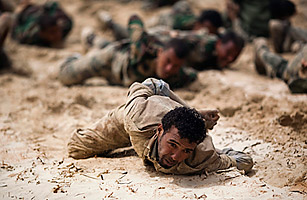
In an open lot on the Dhubat al-Saff military base, a group of Libyan rebel recruits gathers around an instructor demonstrating how to fire a Russian-made ZU-23-2 quad-barrel antiaircraft gun. At the far edge of the same lot, another trainer shows his students how to calibrate a mortar. But while the camp’s instructors explain the technical specifications of their assorted weapons, Jerry Erwin of Vancouver, Wash., is teaching the recruits how to survive on the battlefield. “One, two, three, down!” the beefy soldier shouts, prompting his students to drop on their elbows. As they do, he slowly moves between them, demonstrating how to fall while still holding their rifles in a shooting position.
The selling of military expertise by foreign privateers, or mercenaries, is known as the world’s second oldest profession. But Erwin insists motives are more altruistic and that he is not being paid. He went to Libya in early May, he says, because he was “impressed with the Libyans’ struggle against a dictator.” Having served with the 101st Airborne in the 1980s, Erwin has spent the past 25 years as an Army Reserve intelligence officer specializing in counterintelligence and strategic analysis.